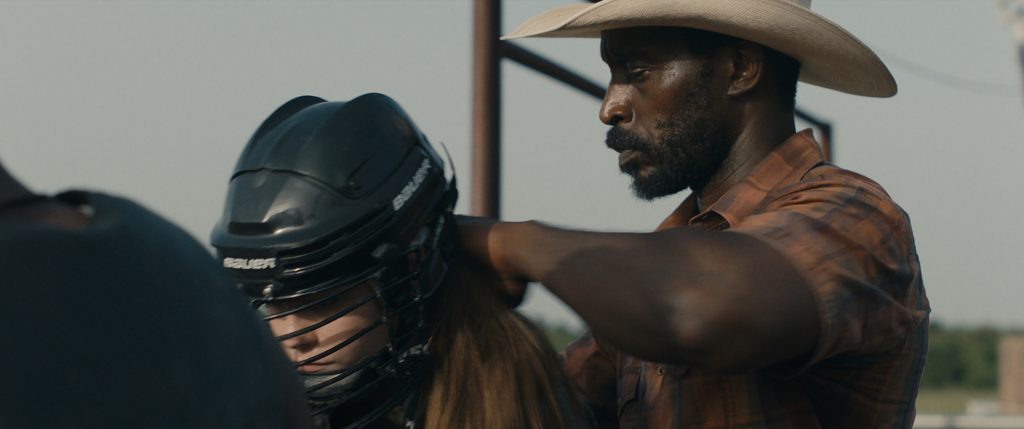Read also:
How to Watch FX Live Without CableHow To Watch AMC Without CableHow to Watch ABC Without CableHow to Watch Paramount Network Without CableAnnie Silverstein’s delicate, uncompromising drama uses the subculture of Black rodeo to paint an aching picture of loss, time and poverty.
While mainstream pop culture still treats the image of a cowboy with a Black face as a cheeky novelty (see: the crossover success of Lil Nas X’s “Old Town Road,” driven as much by the uncommon image of a Black cowboy as by the song’s inherent status as a bop), Black cowboys have been a fixture in American life since the actual Old West. Today, that status is cemented with the Black rodeo, a vibrant subculture that’s existed for decades thanks to touring shows like the Bill Pickett Invitational Rodeo and in places like Houston, Texas, where Annie Silverstein‘s Bull is set. More than a spotlight on an oft-ignored subculture, however, Silverstein’s film is a sumptuous two-person drama that lives and breathes in its characters’ anxieties, a film about poverty that blissfully avoids poverty porn.
Kris (Amber Havard), a fourteen-year-old delinquent with a mother in prison and a directionless life with her exhausted grandmother, feels rudderless and unwanted. So does her neighbor Abe (Rob Morgan), a middle-aged Black rodeo rider feeling the sting and ache of time as his body begins to succumb to decades of physical abuse on the bull. After Abe catches Kris and her friends sneaking into his house to drink his booze, however, a bargain is struck: Kris helps him around the house and in the rodeo ring in exchange for not contacting the authorities.
In a lesser film, one with simpler aims and a greater interest in concrete conclusions, Silverstein would simply have these two broken souls ‘fix’ each other, their shared pain blossoming into something positive that the outside world would reward. Blissfully, painfully, Bull avoids those kinds of pat conclusions in favor of a stark, fly-on-the-wall verisimilitude that skips easy answers for sitting in the long, low ache of that pain. Granted, Abe and Kris do forge an unlikely friendship, and Kris discovers a love for bullriding she hopes to use to help her family earn enough money to move somewhere better. But Abe’s more than a down-on-his-luck cowboy; he’s a grim portent for the lack of salvation the eight (or fewer) seconds on the bull grants you.

Silverstein’s utter commitment to the hardship of these two characters is observational without being sensational, especially as Kris’ need for money (and her exposure to a less-than-positive friend group) leads her down some less than legal pathways. Even through this, Havard’s stone-faced visage hides surprising vulnerability, culminating in a heartbreaking scene in prison where she has to ask her mother if she even wants her. It’s a stunning breakout for her, and it’s gratifying to see such heavy emotional material fall so naturally on her tiny shoulders.
And then there’s Morgan, a stalwart character actor who’s impressed in supporting roles in works ranging from The Last Black Man in San Francisco to Netflix shows (Stranger Things, the Marvel Netflix universe), but who finally gets the soulful, multifaceted lead turn he deserves. His Abe is a man of silent pain, of the kind of macho stoicism that runs through the masculinity of the traditional cowboy, no matter the color of his skin. When he sits in the ring with his cross-painted cheeks, he looks like a god. But alcoholism and resentment have soured him, and Silverstein doesn’t shy away from the self-imposed cages her characters place themselves in.
Blissfully, painfully, Bull avoids those kinds of pat conclusions in favor of a stark, fly-on-the-wall verisimilitude that skips easy answers for sitting in the long, low ache of that pain.
Shabier Kirchner‘s dimly-lit environments capture that dusty, stark world of lower-class Texas without exoticizing it, and Silverstein dares not interrupt the immediacy of her world with an incidental score. The only real violations of this verite look are the moments in the ring, slow-motion faceoffs between man and beast that emphasize the giddy freedom that bullriding teases and so infrequently delivers. And yet, for both Abe and Kris, that pull is irresistible, a potent metaphor for Bull‘s obsession with exploring the passions that hurt and harm us in the same breath.
Sure, you could put this in a similar category as Chloé Zhao’s tremendous The Rider, my flat-out favorite film of that year. But it’s worth examining Bull on its own bittersweet merits, an eye-opening portrait of a subculture largely ignored by the rest of American life. It’s not misery porn by any stretch, but instead places its characters in realistically sticky situations with no easy answers. In a world where systemic poverty keeps us all locked up in cages of our own making, sometimes all we can hope for are eight seconds of escape.

